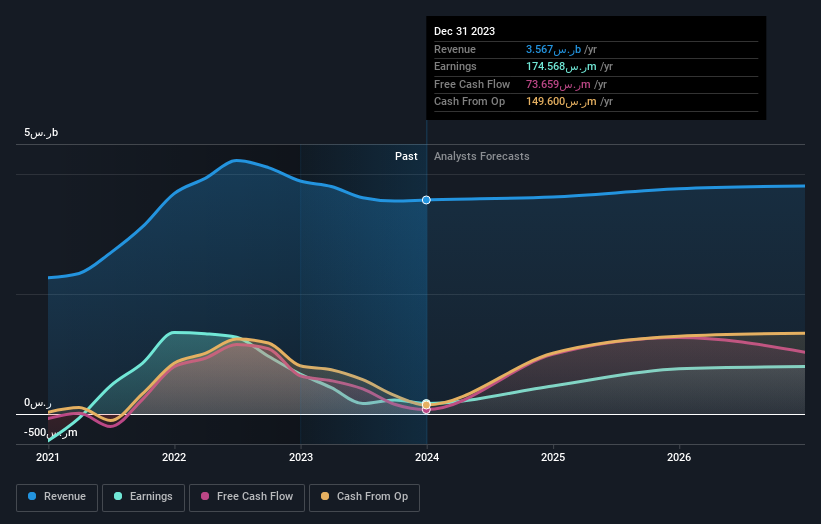- Saudi Arabia
- /
- Chemicals
- /
- SASE:2060
National Industrialization (TADAWUL:2060 investor three-year losses grow to 32% as the stock sheds ر.س629m this past week

As an investor its worth striving to ensure your overall portfolio beats the market average. But if you try your hand at stock picking, your risk returning less than the market. We regret to report that long term National Industrialization Company (TADAWUL:2060) shareholders have had that experience, with the share price dropping 32% in three years, versus a market return of about 16%. More recently, the share price has dropped a further 13% in a month.
Since National Industrialization has shed ر.س629m from its value in the past 7 days, let's see if the longer term decline has been driven by the business' economics.
Check out our latest analysis for National Industrialization
To paraphrase Benjamin Graham: Over the short term the market is a voting machine, but over the long term it's a weighing machine. By comparing earnings per share (EPS) and share price changes over time, we can get a feel for how investor attitudes to a company have morphed over time.
National Industrialization became profitable within the last five years. We would usually expect to see the share price rise as a result. So it's worth looking at other metrics to try to understand the share price move.
Revenue is actually up 13% over the three years, so the share price drop doesn't seem to hinge on revenue, either. This analysis is just perfunctory, but it might be worth researching National Industrialization more closely, as sometimes stocks fall unfairly. This could present an opportunity.
You can see below how earnings and revenue have changed over time (discover the exact values by clicking on the image).

If you are thinking of buying or selling National Industrialization stock, you should check out this FREE detailed report on its balance sheet.
A Different Perspective
National Industrialization shareholders are down 9.9% for the year, but the market itself is up 0.2%. Even the share prices of good stocks drop sometimes, but we want to see improvements in the fundamental metrics of a business, before getting too interested. Regrettably, last year's performance caps off a bad run, with the shareholders facing a total loss of 4% per year over five years. We realise that Baron Rothschild has said investors should "buy when there is blood on the streets", but we caution that investors should first be sure they are buying a high quality business. It's always interesting to track share price performance over the longer term. But to understand National Industrialization better, we need to consider many other factors. For example, we've discovered 2 warning signs for National Industrialization that you should be aware of before investing here.
If you are like me, then you will not want to miss this free list of growing companies that insiders are buying.
Please note, the market returns quoted in this article reflect the market weighted average returns of stocks that currently trade on Saudi exchanges.
Valuation is complex, but we're here to simplify it.
Discover if National Industrialization might be undervalued or overvalued with our detailed analysis, featuring fair value estimates, potential risks, dividends, insider trades, and its financial condition.
Access Free AnalysisHave feedback on this article? Concerned about the content? Get in touch with us directly. Alternatively, email editorial-team (at) simplywallst.com.
This article by Simply Wall St is general in nature. We provide commentary based on historical data and analyst forecasts only using an unbiased methodology and our articles are not intended to be financial advice. It does not constitute a recommendation to buy or sell any stock, and does not take account of your objectives, or your financial situation. We aim to bring you long-term focused analysis driven by fundamental data. Note that our analysis may not factor in the latest price-sensitive company announcements or qualitative material. Simply Wall St has no position in any stocks mentioned.
About SASE:2060
National Industrialization
Operates in the petrochemicals, chemicals, plastics, engineering, and metals sectors worldwide.
Good value with reasonable growth potential.


